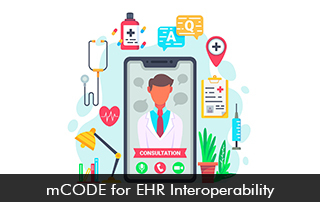The seamless interchange of health information between various healthcare systems, institutions, and research organizations is possible through Electronic Medical Records (EMR) Software interoperability, essential to advancing cancer research. The capacity of various health IT systems to function together well enough to enable the interchange and use of electronic health data is known as interoperability.
What is the Mcode Initiative?
Led by the American Society of Clinical Oncology (ASCO) the Mcode is a data standards project that aims to improve Electronic Health Records Software interoperability for better cancer research.
The Mcode is a great step towards reducing gaps in the data exchange ecosystem by assembling a core set of structured data elements. The aim of the Minimal Common Oncology Data Elements (Mcode) is to facilitate the interoperability of research-quality cancer data.
How can EMR Software Interoperability Contribute to Cancer Research?
Data Aggregation and Standardization
The aggregation of different health data from several sources, such as patient demographics, medical histories, lab findings, imaging reports, and treatment information, is made possible by EMR Software interoperability. Researchers can now see patients’ health profiles more comprehensively because of this large data set.
The Mcode has helped to standardize data formats and coding systems to assure consistency and interoperability, allowing researchers to evaluate and compare data from various EMR systems.
Enhanced Clinical Trials and Recruitment
EHR Interoperability facilitates the discovery and recruitment of eligible volunteers for clinical studies. Researchers may quickly find suitable candidates by combining relevant patient data from many healthcare organizations, minimizing recruitment time and expenses
Facilitates Research Collaboration
Better collaboration between academic centers, research organizations, and healthcare facilities will be facilitated by EMR Software interoperability with the Mcode. Researchers will now have easy access to and sharing of data, making datasets for study more varied and large-scale.
Contribution to Population Health Studies
EMR Software Interoperability makes it possible to analyze big datasets with a variety of patient demographics, which benefits population health research. Trends, risk factors, and differences in cancer incidence, prevalence, and outcomes can all be identified by researchers.
The Main Use Cases of Mcode
- Mcode is designed to support the seamless transfer of electronic consent forms and reports from clinical trials.
- A standard language is provided with Mcode so it doesn’t matter which Electronic Medical Records Software is being used, it can be Epic, AdvancedMD, athenahealth Software, or any system that can be connected to the clinical trial sponsor.
- Mcode also improves data exchange in the radiation oncology field. Radiation oncology providers often use systems from smaller EMR suppliers, which has created issues for interoperability with other providers.
Final Takeaway
Improved EHR Software interoperability with Mcode holds great promise for excelling cancer research by creating new avenues for both data standards and privacy. This can create a collaborative approach to cancer research ultimately enhancing health outcomes.







